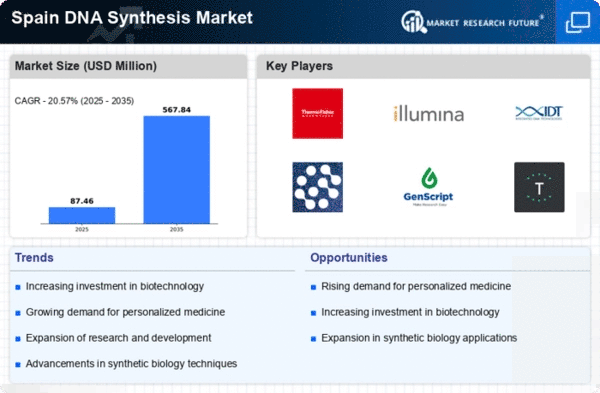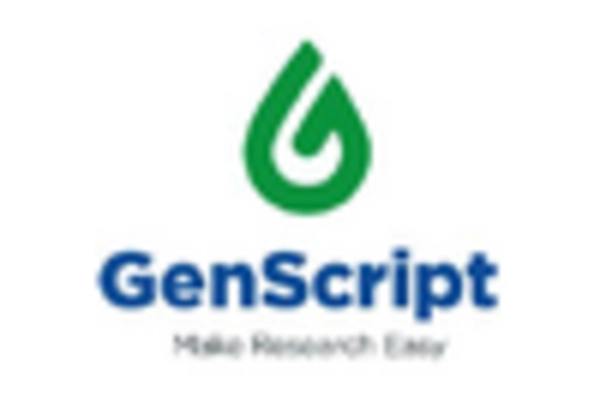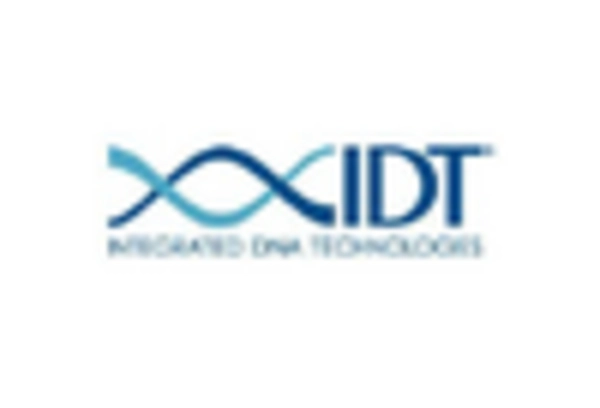Growing Biotech Sector
The biotechnology sector in Spain is experiencing robust growth, which is likely to drive the dna synthesis market. With an increase in biotech startups and established companies focusing on genetic research, the demand for synthetic DNA is expected to rise. In 2025, the biotech industry in Spain is projected to reach a valuation of approximately €5 billion, indicating a compound annual growth rate (CAGR) of around 8%. This growth is fueled by advancements in genetic engineering and synthetic biology, which require high-quality DNA synthesis services. As more companies invest in research and development, the dna synthesis market is poised to benefit significantly from this expanding ecosystem.
Increased Research Funding
Research funding in Spain has seen a notable increase, particularly in the fields of genomics and molecular biology. The Spanish government, along with private investors, is allocating more resources to scientific research, which is likely to enhance the capabilities of the dna synthesis market. In 2025, public and private funding for life sciences research is expected to exceed €1 billion, creating a favorable environment for innovation. This influx of capital enables researchers to pursue ambitious projects that require advanced dna synthesis technologies, thereby stimulating market growth. The emphasis on scientific excellence and collaboration among institutions further supports the expansion of the dna synthesis market.
Rising Applications in Agriculture
The application of dna synthesis in agriculture is gaining traction in Spain, driven by the need for sustainable farming practices. The dna synthesis market is witnessing increased demand for genetically modified organisms (GMOs) that can withstand environmental stresses and improve crop yields. In 2025, the market for agricultural biotechnology in Spain is anticipated to grow by 10%, reflecting a shift towards innovative solutions in food production. This trend is likely to encourage investment in dna synthesis technologies, as agricultural companies seek to develop new traits in crops. The integration of synthetic biology into agriculture presents a significant opportunity for the dna synthesis market to expand its reach.
Emerging Synthetic Biology Applications
Synthetic biology is emerging as a transformative field in Spain, with applications spanning healthcare, environmental science, and industrial biotechnology. The dna synthesis market is expected to benefit from the increasing interest in synthetic biology, as researchers and companies explore novel ways to engineer biological systems. In 2025, the synthetic biology market in Spain is projected to grow at a CAGR of 12%, indicating a strong demand for dna synthesis services. This growth is driven by the need for innovative solutions to complex biological problems, which often require custom-designed DNA sequences. As synthetic biology continues to evolve, the dna synthesis market is likely to play a crucial role in supporting these advancements.
Collaboration Between Academia and Industry
Collaboration between academic institutions and industry players in Spain is fostering innovation in the dna synthesis market. Universities and research centers are increasingly partnering with biotech companies to translate scientific discoveries into practical applications. This synergy is expected to enhance the capabilities of the dna synthesis market, as academic research often leads to breakthroughs that require advanced dna synthesis techniques. In 2025, collaborative projects are projected to increase by 15%, reflecting a growing trend towards interdisciplinary research. Such partnerships not only drive technological advancements but also create a skilled workforce that can further propel the dna synthesis market forward.
















